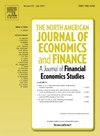Real estate as an inflation hedge: new evidence from an international analysis
IF 3.8
3区 经济学
Q1 BUSINESS, FINANCE
North American Journal of Economics and Finance
Pub Date : 2025-06-15
DOI:10.1016/j.najef.2025.102488
引用次数: 0
Abstract
Assets’ capability to hedge against inflation has again come to the forefront given the recent surge in inflation. This paper investigates the inflation-hedging capability of an important asset class, i.e., real estate, using data from 1990 to the end of 2023 across six countries. By using a Panel Markov switching vector error correction model (MS-VECM), we identify the hedging ability of real estate in crisis and non-crisis periods, both in the short and long term. Real estate provides an effective hedge against inflation in the long run, both in crisis and non-crisis periods. In the short term, real estate securities only hedge against inflation in stable periods, but direct real estate also shows desirable inflation hedging in crisis periods. Real estate (both direct and securitized) effectively serves as a hedge against inflation shocks, particularly protecting against unexpected inflation and against energy inflation during stable periods. While stocks surpass real estate (both direct and securitized) in long-term inflation protection and real estate has short-term benefits, gold distinguishes itself by offering reliable long-run protection, but only in economic downturns. The results should provide important insights to investors seeking to allocate resources more efficiently in those turbulent times, both over the short and long term.
房地产作为通胀对冲:来自国际分析的新证据
鉴于近期通胀飙升,资产对冲通胀的能力再次成为人们关注的焦点。本文利用六个国家1990年至2023年底的数据,研究了房地产这一重要资产类别的通胀对冲能力。利用面板马尔可夫切换向量误差修正模型(MS-VECM),我们确定了房地产在危机和非危机时期的短期和长期对冲能力。从长远来看,无论是在危机时期还是在非危机时期,房地产都能有效对冲通胀。在短期内,房地产证券仅在稳定时期对冲通胀,而直接房地产在危机时期也表现出良好的通胀对冲。房地产(包括直接的和证券化的)有效地对冲了通货膨胀的冲击,特别是在稳定时期防止意外的通货膨胀和能源通货膨胀。虽然股票在长期通胀保护方面优于房地产(无论是直接投资还是证券化投资),而且房地产有短期收益,但黄金的与众不同之处在于,它提供可靠的长期保护,但仅在经济低迷时期。研究结果应该为寻求在动荡时期更有效地配置资源的投资者提供重要见解,无论是短期还是长期。
本文章由计算机程序翻译,如有差异,请以英文原文为准。
求助全文
约1分钟内获得全文
求助全文
来源期刊
CiteScore
7.30
自引率
8.30%
发文量
168
期刊介绍:
The focus of the North-American Journal of Economics and Finance is on the economics of integration of goods, services, financial markets, at both regional and global levels with the role of economic policy in that process playing an important role. Both theoretical and empirical papers are welcome. Empirical and policy-related papers that rely on data and the experiences of countries outside North America are also welcome. Papers should offer concrete lessons about the ongoing process of globalization, or policy implications about how governments, domestic or international institutions, can improve the coordination of their activities. Empirical analysis should be capable of replication. Authors of accepted papers will be encouraged to supply data and computer programs.

 求助内容:
求助内容: 应助结果提醒方式:
应助结果提醒方式:


